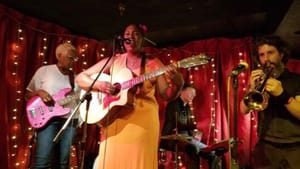Stay in the Loop
BSR publishes on a weekly schedule, with an email newsletter every Wednesday and Thursday morning. There’s no paywall, and subscribing is always free.
Who’s getting onstage in Media?
Following up on a Media, PA, artist’s suspicion of discrimination

In July, I got a call from my friend Danie Ocean, a local musician and singer/songwriter. She told me about a problem she’s having in her hometown of Media, 12 miles southwest of Philly.
I know Danie because I served for a few years on the board of a small nonprofit she cofounded, and I’m a fan of her prodigious musical talent. After almost 15 years of a successful Philly-based career that’s taken her from Austin, Atlanta, and New Orleans to New York and Montreal, Danie moved back to her hometown, and looked forward to entering its burgeoning performance scene.
At home in Media
But as she writes in her own essay for BSR, things were harder than she expected. For the last three years, she says local event organizers ignored or denied her requests to play at Media’s venues and festivals. So she took to open mics and the streets, where she found enthusiastic crowds.
She says many of her colleagues with similar talent and resumes are easily welcomed at Media venues. Danie, a queer, Black, gender-nonconforming artist who is also legally blind, has a guess as to what’s at the root of her difficulty breaking onto the scene in her hometown—especially since she says many of the folks who don’t have trouble getting booked are able-bodied white men.
The 2010 census said Media, a town of about 5,300 people (in less than one square mile), was about 80 percent white. A 2017 demographic estimate put that at almost 85 percent. The Encyclopedia of Greater Philadelphia says Media, built in the 1850s as the new county seat of Delaware County, was intended from the start as a center for both commercial activity and government business. Rail and highway routes made it an important stop on the arteries between Philly, Baltimore, and Washington, DC.
Everybody’s hometown?
But you can trace the town’s history back to the 1680s, when it was a Quaker village called Providence. The Quaker community was going strong almost 200 years later, including local abolitionists who harbored people escaping slavery as they traveled between Wilmington and Philadelphia on the Underground Railroad.
The 20th century brought a contentious but successful push for integrated Media schools in the 1930s. The Media Fellowship House, still operating today, was founded in 1944, the story goes, after a pair of white women witnessed the refusal of service to two Black women at a local restaurant and went with them elsewhere for a joint meal. Local African American residents formed the Media Branch of the NAACP in the 1930s, which worked closely with the Philly and Chester branches in the 1960s.
In the 1970s, a pair of modern shopping malls almost felled Media’s business district, but a major revitalization is under way with the help of organizations such as the Media Business Authority (MBA), making State Street a magnet for shopping, arts and crafts, music, and dining.
Media is becoming its own destination for cultural events, thanks in part to America’s Music Festival Series under MBA’s umbrella. MBA’s slogan is “Everybody’s hometown.”
A shared responsibility
But today, is everybody truly welcome? Is everybody represented? Danie’s experience says otherwise—she names MBA as an organization that has consistently resisted her presence on Media stages. I reached out to MBA for a response, and a promoter for the organization quickly answered, though they would not make a public comment. The staffer promised an answer from MBA executive director Zubair Khan.
Instead, I heard from Paul Patchel, a co-producer of talent for the America’s Music Festival Series, who specified that he was responding to BSR only in relation to three annual events under this series: the Americana Roots Ramble, the State Street Blues Stroll, and the Jazz By Night Celebration.
“We strongly believe that no one should be mistreated or discriminated against because of their race, age, color, sex, sexual orientation, gender identity, religion or ethnic origin,” Patchel said. “It is our shared responsibility to stop discrimination and bias.”
Though unable to speak directly to Danie’s experience, he noted that each year, requests from performers outnumber available venues, and the organization curates all acts that make the cut in individual venues.
“We have never excluded or denied any musician on the basis of identity or ability,” he said. “We are committed to diversity, equity, and inclusion.” He expressed concern about Danie’s experience and pointed to Media native Kim Trusty, a Black woman singer/songwriter, featured at June’s Blues Stroll and inducted in the America’s Music Series Hall of Fame.
Questions remain
I appreciate Patchel’s answer and his expressions of support. But diversity, equity, and inclusion aren’t achieved simply by saying the words, and we need to listen to the lived experience of marginalized folks—especially people like Danie, living at the intersection of discrimination based on race, gender, sexuality, and disability. Why can’t MBA make a comment beyond the three events Patchel references? Why can’t executive director Khan speak up, instead of associated promoters and producers, especially when I was told to expect his comment?
Staffers under the MBA umbrella, while they certainly are aware of Danie as an artist, say they were unaware of her difficulty in Media. But they answered BSR’s query with alacrity.
As Danie says, history will decide—and it’s still being written today, on stages large and small. Are we paying attention?
Read Danie's original essay here.
Sign up for our newsletter
All of the week's new articles, all in one place. Sign up for the free weekly BSR newsletters, and don't miss a conversation.

 Alaina Johns
Alaina Johns